| Welcome |
| Aujaujuq! It is summer! In Inuit Nunangat, this is the season of the midnight sun. This summer marks 150 years since the founding of Canada. For many Indigenous peoples, 2017 invokes conflicted celebrations. On the one hand, First Nations, Inuit and Métis are reminded of the persistent inequities that influence their health and well-being. These include continued and unacceptable boil water advisories, housing shortages, and food insecurity; the disproportionate number of Indigenous children in care; and inadequate access to healthcare to name a few. On the other hand, Indigenous peoples are jingle dress dancing, jigging, and throat singing; they are setting up culture and language camps; youth are seeking out the knowledge of their Elders; and celebrated Indigenous poets, playwrights, and painters are abound. Not to mention, Indigenous and non-Indigenous peoples throughout Canada are beholden to reconciliation and taking up the ninety-four Calls to Action of the Truth and Reconciliation Commission of Canada. At the National Collaborating Centre for Aboriginal Health (NCCAH), we are celebrating the achievements of Indigenous peoples across Canada through our recently released "Voices from the Field" podcast series. The first three podcasts in this series feature community-driven action for Indigenous language revitalization, repatriating birth to a northern First Nation, and an award winning medical program supporting the development of Indigenous health professionals. We also celebrate our participation in national and international meetings where we present our work, share our knowledge resources, and expand our partnerships and collaborations. These events include the Creating Spaces VII Health Arts and Humanities Symposium (Winnipeg, April 28-29, 2017), the Canadian Conference on Medical Education (Winnipeg, April 29 - May 2, 2017), Lighting the Fire 2017 (Winnipeg, May 10-12, 2017), the 2017 World Forum on Early Care and Education (New Zealand, May 9-12, 2017), the Parliamentary Health Research Caucus Reception (Ottawa, June 5, 2017), Public Health 2017 (Halifax, June 6-8, 2017), the 12th National Community Health Nurses of Canada's Conference (Niagara Falls, June 20-22, 2017), the 2017 Learning Institute: Reconciling Indigenous Research Relationships (Victoria, June 29, 2017), and the World Indigenous Peoples Conference on Education (Toronto, July 24 -28, 2017). In closing, if you are interested in knowing about all of our publications, please see the Resources Booklet: Spring/Summer 2017. Be sure to visit our website or subscribe to our mailing list to receive notifications of newly released NCCAH resources, upcoming webinars and our regular quarterly newsletters. Please enjoy and share our knowledge resources with your community and networks and join us on Twitter, Facebook, Google+, LinkedIn, Vimeo, YouTube, SoundCloud, or ISSUU to participate in updates as they happen! On behalf of all the staff at the NCCAH, I hope you enjoy the summer months ahead. Meegwetch Margo Greenwood, Academic Leader
National Collaborating Centre for Aboriginal Health (NCCAH) |
|
| Attended Events |
Upcoming Events |
| Public Health 2017 (CPHA) Halifax, Nova Scotia, June 6-8, 2017. Conference web site link
12th National Community Health Nurses of Canada's Conference (CHNC) Niagara Falls, Ontario, June 20-22, 2017. Conference web site link
Please visit the online NCCAH calendar of events, which highlights conferences, workshops, and other events of interest in the field of Aboriginal Health including regional, national and global listings. |
World Indigenous Peoples Conference on Education (WIPCE) Toronto, Ontario, July 24 -28, 2017. Conference web site link
Send us an email to [email protected] with "Calendar Submission" in the subject line if you have an event you would like added to our calendar. |
|
| New NCCAH Resources |
Two Spirit! Let's Hear It! - An Introduction to Two-Spirit Health The webinar resources from "Two Spirit! Let's Hear It! - An Introduction to Two-Spirit Health", delivered by Dr. Sarah Hunt on April 12, 2017, are now available online. In this webinar, Dr. Sarah Hunt provided an introduction to the health of Two-Spirit people. First, the diversity of meanings ascribed to Two-Spirit was discussed, as a term used to describe an array of Indigenous identities and expressions of gender and sexuality. Within a social determinants framework, an overview of the impacts of colonization was provided as a key component of understanding the health of Two-Spirit people. A strengths-based approach was used to present an array of practical measures health practitioners, policy makers, and researchers can use to foster Two-Spirit health. |
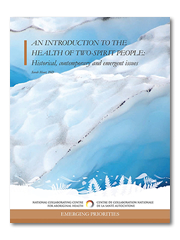
An Introduction to the Health of Two-Spirit People: Historical, contemporary and emergent issues |
| Please follow the links listed below to access these digital resources. Watch on YouTube | Listen on SoundCloud | PowerPoint PDF | PowerPoint Show Self-reflection questions | Beyond "At Risk" info sheet | Post webinar resource links Read the full webinar resources announcement |
|
What's new is really old: Trauma informed health practices through an understanding of historic trauma The webinar resources from "What's new is really old: Trauma informed health practices through an understanding of historic trauma", delivered by Dr. Patricia Makokis and Dr. Margo Greenwood on April 21, 2017, are now available online. Trauma informed health practices are the latest buzz words in the health field. The new is really the old. Teachings of the Elders and the practicing of these teachings have been the saving graces for many Indigenous Nations, amidst the adversity of historic trauma and the resultant complexities of grief and loss and lateral violence. In this webinar, Dr. Makokis spoke from a community-based perspective, while Dr. Greenwood spoke to her work within the regional provincial health authority and the NCCAH. Both have worked in the field of community-based health for a number of years. Please follow the links listed below to access these digital resources. Watch on YouTube | Listen on SoundCloud PowerPoint PDF | PowerPoint Show Post webinar resource links Read the full webinar resources announcement |
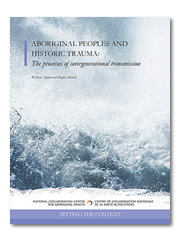
Aboriginal Peoples and Historic Trauma: The process of intergenerational transmission 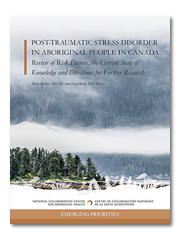
Post-Traumatic Stress Disorder in Aboriginal People in Canada: Review of risk factors, the current state of knowledge and directions for further research |
|
"Voices from the Field" Podcast Series The Voices from the Field, a podcast series produced by the National Collaborating Centre for Aboriginal Health (NCCAH), focuses on innovative research and community-based initiatives promoting the health and well-being of First Nation, Inuit and Metis peoples in Canada. SoundCloud playlist | Read the podcast announcement |
| Episode 01 - Nehiyawak Land and Language Camp: Revitalizing Indigenous languages for health and well-being with Belinda Daniels This episode looks at the Nehiyawak Land and Language Camp, a week-long land-based Cree immersion program in Saskatchewan. This camp was developed by Cree scholar and second-language learner, Belinda Daniels. Listen on SoundCloud | Speaker bio & transcript |
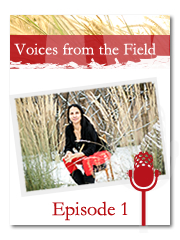
Episode 01 with Belinda Daniels |
| Episode 2 - Birthing experiences of First Nations women from northern and remote communities with Dr. Jaime Cidro This episode provides an overview of a community-driven research project underway on the birthing experiences of First Nations women from Norway House Cree Nation in northern Manitoba. Listen on SoundCloud | Speaker bio & transcript |
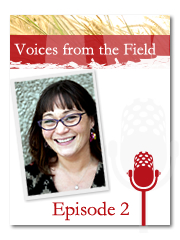
Episode 2 with Dr. Jaime Cidro |
| Episode 03 - Indigenous Physicians Lisa Richardson and Jason Pennington win the 2017 Dr. Thomas Dignan Indigenous Health Award In this episode you will hear from Indigenous Drs. Lisa Richardson and Jason Pennington who have been awarded the 2017 Dr. Thomas Dignan Indigenous Health Award from Royal College of Physicians and Surgeons of Canada. Drs. Richardson and Pennington spoke to the work underway at the Office of Indigenous Medical Education at the University of Toronto. Listen on SoundCloud | Speaker bios & transcript |
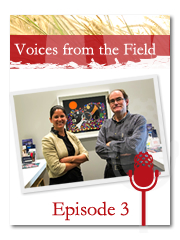
Episode 03 with Drs. Lisa Richardson and Jason Pennington |
|
Resources Booklet: Spring/Summer 2017 This resource booklet provides an overview of the activities, mandate and publications of the National Collaborating Centre for Aboriginal Health (NCCAH). It has been designed as a quick glance at over 170 knowledge resources, including fact sheets, reports, DVDs, reviews, and social media links, available on the NCCAH web site within the four main areas of our work. Request NCCAH publications |
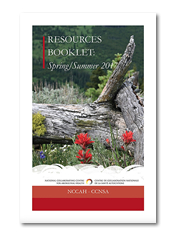
Resources Booklet:
Spring/Summer 2017 |
|
| To be released in 2017 |
NCCAH Fact Sheets
- Education as a social determinant of First Nations, Inuit and Métis health (with an infographics page)
- Employment as a social determinant of First Nations, Inuit and Métis health (with an infographics page)
- Reconciliation in First Nations child welfare
- Indigenous Children and the Child Welfare System in Canada
Multimedia
- "Heart Health" digital stories series
- New interactive timelines
|
NCCAH Reports
- Indigenous Communities and Family Violence: Changing the conversation by Cindy Holmes, PhD and Sarah Hunt, PhD
- The Built Environment: Understanding how physical environments influence the health and well being of First Nations peoples living on-reserve by Roberta Stout
- Menopause and Indigenous women in Canada: The State of Current Research by Regine Halseth, Dr. Charlotte Reading, & Nicole Robinson
|
|
| Request NCCAH Knowledge Resources |
| Did you know you can request our publications free of charge? Send your requests to [email protected] with "Publication Request" in the subject line, which publications you would like, a note about how you will utilize the resources, how many copies you'd like, your name and mailing address. We will do our best to accommodate your requests based on our current available printed inventory. Do you have a particular NCCAH publication that you or your organization found to be an excellent resource? If so let us know what it was by emailing us at [email protected] with "Publication Testimonial" in the subject line. We welcome your feedback. All NCCAH materials can be reproduced in whole or in part with appropriate attribution and citation. These materials are to be used solely for non-commercial purposes. To measure the impact of these materials, please inform us of their use by sending an email to [email protected] with "Publication Citation" in the subject line. |
|
| Online Resources |
| In support of creating a health community focused on knowledge synthesis, transfer and exchange we have chosen a sampling of current online resources to share. Please note the links provided in the NCCAH newsletters are for general interest only and do not indicate an endorsement. The views expressed in the linked resources do not necessarily represent the views of the NCCAH or our funder the Public Health Agency of Canada. Send us an email to [email protected] with "Online Resource" in the subject line if you have an online resource you would like added to our next newsletter. |
|
| 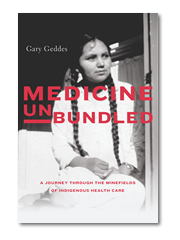
Medicine Unbundled: A Journey through the Minefields of Indigenous Health Care by G. Geddes |
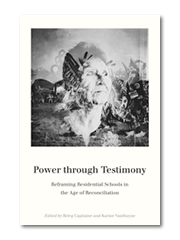
Power Through Testimony: Reframing Residential Schools in the Age of Reconciliation, edited by Brieg Capitaine and Karine Vanthuyne, UBC Press |
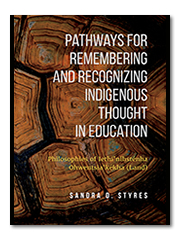
Pathways for Remembering and Recognizing Indigenous Thought in Education: Philosophies of Iethi'nihstenha Ohwentsia'kekha (Land) by S. Styres, U of T Press |
| 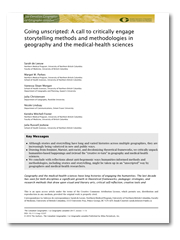
The Canadian Geographer - Going unscripted: A call to critically engage storytelling methods and methodologies in geography and the medical-health sciences |
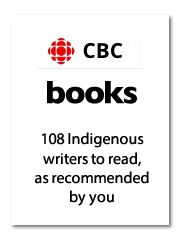
CBC Books - 108 Indigenous writers to read, as recommended by you |
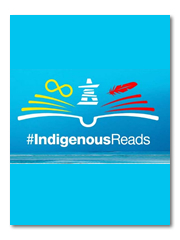
INAC - #IndigenousReads - Indigenous Book Club Month |
| 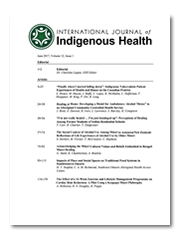
International Journal of Indigenous Health (IJIH), June 2017, Vol. 12, Issue 1 |
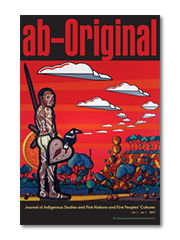
ab-Original, Journal of Indigenous Studies and First Nations and First Peoples' Cultures, Penn State University Press |
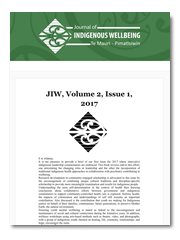
Journal of Indigenous Wellbeing (JIW), Vol. 2, Issue 1, 2017 |
| 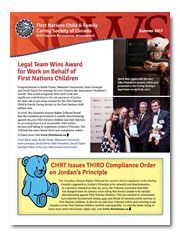
Caring Society Newsletter - Summer 2017 |
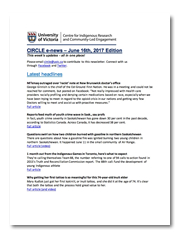
UVic Centre for Indigenous Research and Community-Led Engagement (CIRCLE) - June 2017 |
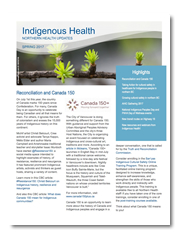
Indigenous Health Northern Health Updates - Spring 2017 |
| 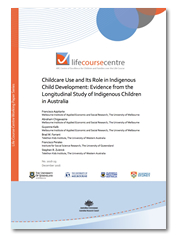
Childcare Use and Its Role in Indigenous Child Development: Evidence from the Longitudinal Study of Indigenous Children in Australia |
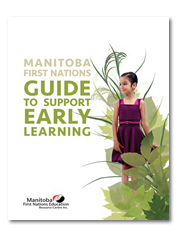
Manitoba First Nations Education Resource Centre (MFNERC) -Manitoba First Nations Guide to Support Early Learning |
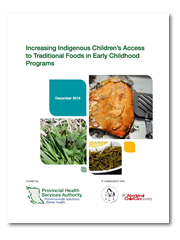
BC Aboriginal Child Care Society (BCACCS) - Increasing Indigenous Children's Access to Traditional Foods in Early Childhood Programs |
| 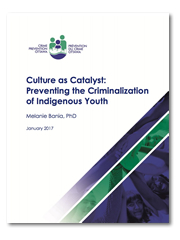
Crime Prevention Ottawa - Culture as Catalyst: Preventing the Criminalization of Indigenous Youth |
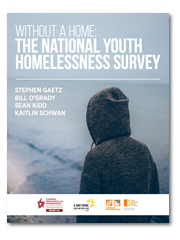
Without a Home: The National Youth Homelessness Survey |
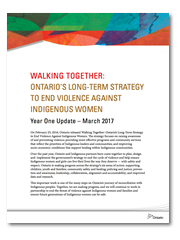
Walking Together: Ontario's Long-Term Strategy to End Violence Against Indigenous Women |
| 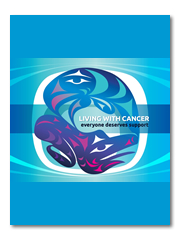
FNHA - Living with Cancer: Everyone Deserves Support |
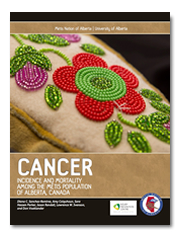
Métis Nation of Alberta (MNA) - Cancer Incidence and Mortality among the Métis Population of Alberta, Canada |
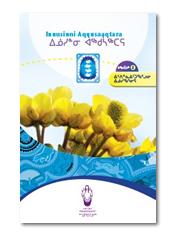
Inuusinni Aqqusaaqtara - My Journey Resources - Cancer information in English and regional dialects of Inuktitut |
| 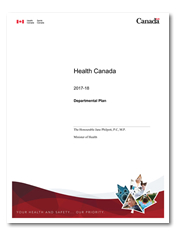
Health Canada 2017-18 Departmental Plan |
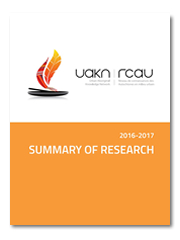
Urban Aboriginal Knowledge Network (UAKN) - 2016-2017 Summary of Research |
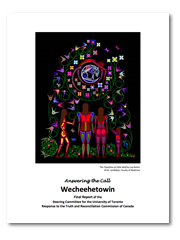
U of T TRC Steering Committee Final Report - Answering the Call: Wecheehetowin |
| 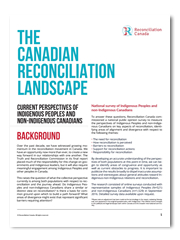
Reconciliation Canada - The Canadian Reconciliation Landscape |
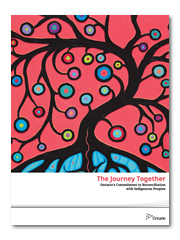
Ontario Government - The Journey Together: Ontario's Commitment to Reconciliation With Indigenous Peoples |
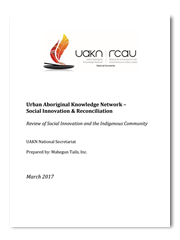
Urban Aboriginal Knowledge Network (UAKN) - Social Innovation & Reconciliation |
|
|
| Online Multimedia |
| This section features infographics, interactives, apps or videos that we found interesting or educational. Please note the links provided in the NCCAH newsletters are for general interest only and do not indicate an endorsement. The views expressed in the linked resources do not necessarily represent the views of the NCCAH or our funder the Public Health Agency of Canada. Send us an email if you have multimedia resources you would like included in our next newsletter to [email protected] with "Multimedia Submission" in the subject line. |
| 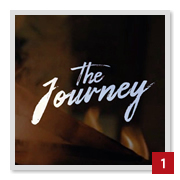
|
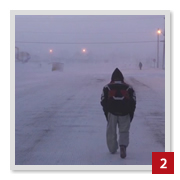
|
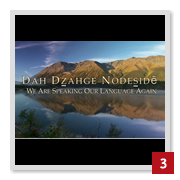
|
| 1) "The Journey" documentary profiles three recipients of support from the Canadian Nurses Foundation. Danielle, Isabelle, and Sharlene share their experiences and challenges on their journey to working in the nursing profession. Indigenous nurses are often the first point of contact and the only health care providers in Indigenous communities. 2) A feature documentary by Kitra Cahana and Ed Ou, "Dancing Towards the Light", showcases how dance has become a positive force of hope and healing through the Sila Rainbow Dance Competition, an annual event that highlights the talents of Arviat youth. 3) Dah Dzahge Nodesidē (We Are Speaking Our Language Again) - Tahltan language revitalization documentary. |
|
| The NCCs of NCCPH |
| 
|
The NCCs of NCCPH work together to promote and improve the use of scientific research and other knowledge to strengthen public health practices and policies in Canada. We identify knowledge gaps, foster networks and translate existing knowledge to produce and exchange relevant, accessible, and evidence-informed products with practitioners, policy makers and researchers. Read the latest NCC e-bulletin |
|
Let's talk: Racism and health equity The seventh release in the NCCDH "Let's Talk" series discusses racism as a critical factor that impacts health and wellbeing. It describes the concepts of race, racism and racialization and emphasizes settler colonialism and structural racism as the root causes of health and social inequities experienced by Indigenous and racialized peoples in Canada. Read the web story | Download the resource |
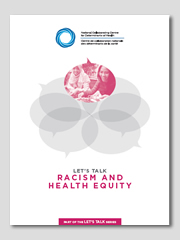
Let's talk: Racism and health equity |
|
|